Oshe Meyi: Meaning, Tips, Sayings, Traditional and more 5-5
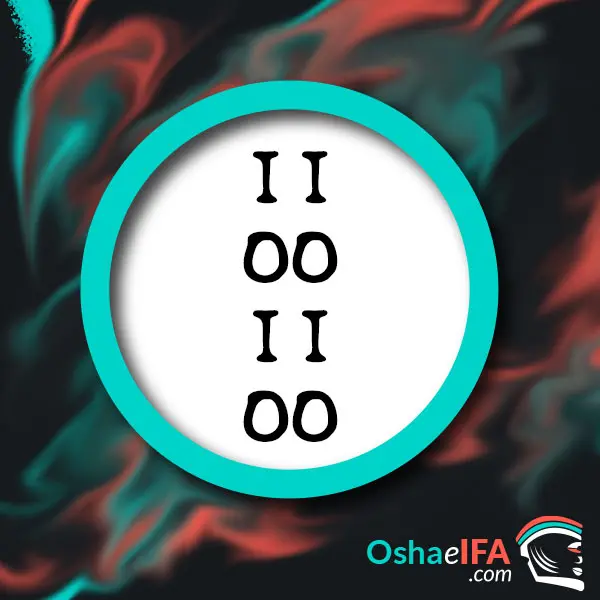
Oshe Meyi is a sign of long life, he was the Odu that lived the longest on Earth and represents half the world, from the East. Ifá says that he will take this person to a safe place. He must offer sacrifice for it. It foresees distancing between brothers, sorcery, moorings, where the person has to receive Ifá.
What is born in the odu of Ifa Oshe Meyi?
- That you do not look without paying for this Odu.
- The ossuary and presides over the burials.
- The fragrant ointment and perfume.
- The peeling.
- Doing OSHA where YEMAYA delivered the Dilogún.
- Stagnation of blood.
- Cancer of the skin.
- The shackle.
- The joints of the joints of humans.
- Gangrene, everything rotten.
- The slave trade and the exchange for snails.
- He stop trading with the Dilogún.
- Use parrot feather to decorate the hat.
- Think carefully before making your promises, as once made they are irrevocable.
- The ban on throwing the snail is born.
- They are born: String musical instruments.
- The genius.
- The distribution of the animals that each Osha eats.
- Slavery and moving.
What does the sign Oshe Meyi talk about?
- The children of this Odu cannot use the Ruda plant, it is taboo for them.
- Oshe Meyi talks about sexual impotence.
- The woman suffers from complexes about her breasts.
- The person falls in love with himself.
- When the clothes are washed it does not twist because it is backward for the person.
- Speaks a divinity called OLUGBODE (Orisha patron of children and infants), who has no legs, is crippled.
- Silver was formed, the celestial appearance.
- Carey is given to OSHUN.
- The parents did not raise him, that is, he is an orphan.
- Talk about the abandonment of mothers and children.
- Languages were shared by humanity.
- The female priestess must use supersensible vision to divine after making a pact with the Elders of the Night.
- You have to keep the haircut short.
- In Oshe Meyi, Olodumare curses for believing the person to have superior gifts.
- OLOFIN gave ashé.
- Before OLODUMARE both men and women are equal.
- The person is a fortune teller before and after death.
The Oshe Meji sign points out:
- The person has to move several times.
- ELEGBA fed in garbage cans.
- It is born to put the Cross, the snail and the head of the hen to the Saints to ORUNMILA
- One brother cheats on another.
- 25 pigeons are given to OSHUN.
- OSHUN had to become a prostitute.
- It was in Oshe Meyi that for the first time the Ópkuele was thrown on the floor for the consultation and they have to pay.
- Jutía is fed to Azojuano (San Lázaro)
- The herbs are: Buttercup, Tulip, Romerillo, Ikin Leaf, Pica Pica, Curujey, yam leaves, blood grass, red mangrove, Ceiba, flax, jagüey, onion, poplar, orchid, pepper stick, ewe awedó.
You may also like: Odu of Ifa Iroso Meyi
Recommendations of the Oshe Meji sign:
The person has to become a Saint (YOKO OSHA) and if he is a man, receive Ifá to avoid impotence.
Treat women well and see how he says things to avoid misunderstandings, avoid being corrupted, or force her into the sexual act, when she has no desires; listen to their advice, it will do you good. Give the obiní an amber necklace or ring. Wear five kinds of perfumes, including amber, which will be for the handkerchief only and is put in front of OSHUN.
OLOFIN and ODUDUWA are glued to the person.
Do not cut your hair. Use soap, towel and scouring pad just for him. The soap should be thrown away before it runs out.
The woman must gain weight due to the complex of the breasts.
SHANGO is the protector of the person, he likes red.
Put Eshu head of fish or mouse.
OSHAGRIÑAN and OSHUN partnered to eat inside, without anyone seeing them.
OSHE MEJI are the conduits of the blood.
When the sign BABA OSHE MEYI is presented at the initiation of Igbodun, the initiate must be told never to seek money greedily, he must be restrained and discreet, with enormous patience, so that money does not bury him. Should
sacrifice two pigeons, two ladders and four bolts. Nail the U-shaped pins in the four corners of the circle and serve the two pigeons and crushed yam, since yam and pigeon are the main food of the money.
Sacrifice a goat and the backbone of a snake to Eshu, a goat to its head, a ram to Ifá, which must be killed before offering it. Its head must be washed with the head of the ram and add two hundred and one leaves,
pronouncing the following incantation:
The hand is longer than the head
When it is extended upwards
The rainbow cuts the sky totally
and not in halves.
This is an evil bird that treats
to prevent other birds
of the flight in Heaven.
My Guardian Angel leaves me
prosper only with my contemporaries.
With this Odu as a patron he must not eat snake meat.
Meaning of the Sign of Ifa Oshe Meyi
OSHE MEYI is always at war with IRETE MEJI, accusing him of being a thief.
It is a sign of blood, work, crying and sadness because they are his great companions.
Only they know what they want, because there is no one in the world who understands them.
They must be careful with the blood, as it is easy for them to get sick from this cause.
They are impulsive and spiteful, they do not believe in anything or anyone, some come out very grateful, but others do not appreciate anything.
Their conviction is what they believe, they are boastful and lacking, sentimental and strong.
They suffer pain in the bones and especially in the joints. They suffer from blood, heart, legs, belly, brain, anemia, throat, temporary insanity; systematically checking the hemoglobin with the doctor, speaks of circulatory problems, so Aloe Vera is recommended as a cleanser.
Enunciates rashes and itchy skin. Talk or skin cancer is born. There is sexual impotence. Talk about strokes. The Odu Oshe Meji speaks of blindness and visual disturbances. Heralds the birth of gangrene. Talk about obstruction of the veins and heart attack.
They are soothsayers and usually good spiritualists. They have an EGUN that speaks to them and tells them the things they need, although their strength is in ORUNMILA and OSHUN, with their eyes they see beyond what they can.
They like to gossip and find out about things, even if it doesn't interest them.
They are friends with problems with the law, because they themselves seek it out and suffer for someone other than them.
They like happiness and parties, drinking, which they cannot practice.
You must worship OBATALA, who gives you everything.
They are the smallest in religion and that is why OLOFIN gave them the ashé of divination.
They are blissful to the fullest, they cannot be easily fooled because they are insightful and consistent.
Its secret is the sand of the river.
The woman cannot throw snail, attend the spiritual field and attend through the deck.
OSHE MEJI is disowned in the bosom of his family, they disown him and do not consider him, his best friend can betray him.
OSHUN was born in three lands: IJESA, MAGINO and IFE.
Sayings of the Odu of Ifa Oshe Meyi:
- Money falls on me from Heaven and if I'm not careful, it will bury me.
- This is not the time to show struggles.
- Losing, you win.
- Bathing in the river rejuvenates me.
- The dawn of the day is visible to all.
- Intelligence is better than strength.
- The son of the cat, catches mice.
- The needle leads to the thread.
- The taste for freedom, if it is not accompanied by respect for OLODUMARE and others, is a path that easily leads to one form or another of slavery.
- Monkey sees, monkey does.
- The roasted yam said to the man: "If you are going to eat me, IKU will come after to eat."
- The palm is believed that by having some stalks it gives him the right to believe himself King.
- A fish cannot, without danger of death, insult the alligator.
- Blood running through the veins.
- There is no tomorrow that stops becoming yesterday.
- Consent is joy to the son of the rich man.
- Don't expect those you defeat in the fight to reward you with a gift.
- Do not look for money in haste and greed because it will serve for your own burial.
- The hand is longer than the head when extended upwards.
- The knee of the cripple does not bend.
- No one kills the food offering for him.
- He who knows how to wait, let the gales come.
- Who perseveres wins.
- Luck comes for an offense.
- Don't flaunt your merits.
- Nobody can take what is truly yours, but it can be interrupted.
- Some win with good arts and others with bad.
- Don't flaunt your merits.
- Among your friends and family there are envious

Odu Oshe Meji Ifa Code of Ethics:
The welfare of the Awó starts from its opposite.
Ifa Oshe Meyi says:
When the sign of Ifa OSHE MEJI appears in divination, the person should be advised to refrain from doing things that lead to shows of force. You must be told that you are not thriving in life and that you will not succeed, unless you change your ways of resorting to care and discretion in all your activities.
That is the reason why anytime OSHE MEJI comes in divination for anyone, the person is advised to look for money carefully and discreetly so that it does not destroy it.
When this Odu comes for divination, the person should be advised to make sacrifice so that obstacles raise his prosperity and can reduce difficulties.
If the Oddun Oshe Meyi appears in divination for a person who intends to go on a trip, he should be told to make sacrifice against the risk of losing his property to a vindictive person without having to fight again.
La Caridad del Cobre haunts him, as does betrayal and tragedy. You have to make a mass for a dead relative.- Wherever you plan to go, there is a person who wants to take them all. There is a woman who is pregnant, tell her to do Ebó if she wants to save the child from death.-In time, you must have money and happiness, but follow the advice, otherwise you will be disgraced.- Death wants to go to your house. Be careful where you sit. Not a step without money.
You have to do Ifá.- Avoid being upset with another person because of money that you have already paid. Light two candles for your father.
You must refrain from making displays of force. You are not thriving in life and you will not succeed unless you change your ways of resorting to care and discretion in all your activities. You must make sacrifices so that obstacles lead to your prosperity and reduce difficulties.
Prayer of the Odu Baba Oshe Meyi:
MULU EULUSHE KULUSHE OSIWE OSHUN IBO NENILE ARUN
OMOLODE IKU OSHA DERENI WAYE OKO ADIFA YOKO ORUNMILA,
KAFEREFUN OSUN, OSHUN TO YOU ELEGBA BOGOLATE OLUOPOPO.
Suyere Oddun Oshe Meji:
IKU IWA ILE KALEBO ADUN IWA ILE KALEBO EGGUN IWA ILE KALEBO.
You may also like: Treaty of Ifa, Oddun Obara Meyi
Ebbo of the Odu Oshe Meyi Ifa:
Capon goat to OSHUN.
The goat to OSHUN must be a weather capon, so that it does not have the plague. A plum leaf is placed in its mouth and ciguaraya and achibatá leaves are placed on its head. In case you have to castrate him at the moment, take a prayer that you have to
say before handing it over. Never castrate at the door of the Igbodun ORISHA or the Saint's room.
I PRAY: OSHUN WOLODO ATETE OUNKO OKON EYI KORO EKUON ODARA
With the testicles a ceremony is made with: hutía and smoked fish, toasted corn, white cloth and it is taken to the river.
Paralysis of the Oshe Meji sign:
Chicken, 3 coconuts, 3 pigeons (1 white, 1 brown, 1 black), 1 chicken egg, fish and pumpkin guts, yellow cloth, ekó, smoked fish, corojo butter, corn, brandy, honey, 4 peppers . The hen to OSHUN and the guts and the head for the ebo. The person is cleaned with the brown and black pigeons, and the white one is for the bathroom. An omiero with dead scare is prepared for baths. OSHUN is given OBI OMI TUTO and 2 candles are lit, begging for his help. Odu IRETE YERO, OSHE MEYI and OTURA NIKO are put on the Paraldo fabrics, in that order. Everything is asked.
Work for development.
La Niña herb, cinnamon powder, holy water, Church incense, 1 chicken egg. Everything will be beaten and then smeared on the hands, face and head. If you want, it can be done all over the body.
Tips from the oddun of Ifa Oshe Meyi:
Give Eshu and the Guardian Angel a goat to eat so they don't lose in a fight.
The throw of the Ókpele on the mat or board means the fall in combat of OSHA MEJI; and in memory of that fact you have to pay money during a divination consultation.
If this Odu (Oshe Meyi) comes for a sick person, he must sacrifice a goat to Eshu to avoid being killed by the forces of evil, due to his stubborn ways.
To avoid being accused and prosecuted, you must sacrifice a goat to Eshu, a pig to Ifá, a goat to its head, a rooster to OGUN, and a gelding to the Dignitaries of the Night.
Sacrifice for prosperity: In the river a goat is offered to Eshu and the person takes three dives in it.
- Dried fish in the left hand and fresh fish in the right.
- White fabric on the left and black fabric on the right.
- Two hundred cowries in the left hand and accounts in the right.
Overcoming enemies throughout life, they sometimes eat with you in your own home.
It tells of a protective ancestor who advises you to make sacrifices for EGUN.
Receive ODUDUWA and IGBA-ODU.
For a pregnant woman, OSHUN and ORISHANLA must be sacrificed to succeed in labor.
Open your eyes wide, do not commit incest.
His great weapon is discretion.
Offer sacrifices for the Deity OLUGBODE (Orisha patron of children)
Never assume you are in debt.
When this Oshe Meji appears in ordinary divination, the person will be advised to propitiate his own Ifá, since he will become a future priest of ORUNMILA.
The Sign Oshe Meyi speaks that to have children you must offer sacrifices to Ifá.
Drum is recommended to OSHUN, after offering sacrifice.
You may also like: Sign of Ifa Oshe Tura
Ifa Oshe Meji Oddun Treatise
Dressing in a three-color combination is prohibited.
With the backbone of the serpent to Eshu, his strength matures.
Person of strong constitution and invincible fighter.
Give a large cow, a large goat and rams to the Guardian Angel.
Good fortune and death lie in wait for him, but if he makes the necessary sacrifice, fortune comes within his grasp and prevents premature death.
OLODUMARE saves life from an accident, especially in rainy seasons.
The Odu speaks of fortune buried by his ancestors, listen or analyze his dreams.
Commercial activities become prolific. The star of the woman scatters wealth and prosperity on the husband.
OSHE MEYI's wife may be a witch, but despite this, at the end of life they live happily.
He must bathe in the river to wash off the signs of old age.
In this Sign, Eshu punishes for bad behavior, just as he did to the toad. OSHUN and ORUNMILA save from death, flowers and leaves of pumpkins to both, also includes the pumpkin, ask Ifá. You must not eat pumpkin.
The dead man wants to end everything, he comes to prostrate him, make EGUIRI, which prevents him from Ikú.
The woman must be extremely careful when harboring a man by her side as they are misunderstood.
For the man, a spirit separates him from the women. Add water with brown sugar and Mar Pacífico to it.
Men like women to work for them but this ends in war and the exploiter loses, because women do not allow themselves to be ruled by anyone and are capable of using all their resources in their favor.
Avoid the love triangle. Two women can face death for one man.
Children, at the mother's command, cheat and steal from their parents. Parents cast witchcraft and sendings to their children. Children can die by accident.
The man triumphs Faith with Faith and avoiding vices and partying.
Pataki of the sign of Ifa Oshe Meyi:
ORUNMILA faces the Gladiator King.
ORUNMILA went around the world without money and with nothing. The King of that land was a great gladiator, boxer, fighter. Eshu tells ORUNMILA that he will face the King, but ORUNMILA tells him that he did not know and Eshu advises him to jump to the
ground when they hit him.
ORUNMILA did so, a moment that Eshu takes advantage of to tell the King that he had killed him and in return asked him for carts of all things to save the curse that was coming on the town. Thus ORUNMILA became rich.
NOTE: At OSHE MEYI things are expensive, avoid doing business with others. Put jewelery on Eshu.
He who knows how to wait, let the gales pass.
Note: This Odu refers to adversity to secure your home, you have to move several times. If he is a man, the person is Faith with Faith, he likes all vices and partying. If he is a woman, he can be homosexual (Alakuata). This path is very delicate.
HISTORY
According to the Yoruba legend, OSHUN, SHANGO and their son lived in a palm that was knocked down by a gale, but the storm killed the son of their loves.
SHANGO, wounded with grief and in pain from that misfortune, decided to move to a lush almond tree and when OSHUN was somewhat consoled, ESHU BARAQUINQUEÑO, who was the owner of that corner, and in an hour, with
his destroying ax made the tree shake.
A little dejected, this couple went to a cedar forest, joining in a very lush one that existed there. One day, SHANGO went out looking for food and when he returned he saw his house destroyed by a group of cannibals. His wife was so scared that she got sick and miscarried. Then SHANGO, singing his songs, mitigated his wife's pain, since the death of the other son increased her sorrows.
They went to a Jagüey and when they went to build their house, they saw a snake at its roots. And when both were about to start preparing their home, they had to flee because the snake pounced on them. SHANGO, not giving up, knocked down a flowery pine nut and made his fourth nest and thus achieved victory.
According to legend, in the next Deity of the mountain, the city and the prairie, and his long war he saw that OSHE MEJI, in his struggles for life, always won.
Oshe Meyi Ifa Traditional Nigerian
I KNOW MÉJÌ
Òpó illé ni ò se mulunkú mùlùnkú
A day fún won lóde Ìbàdàn
Níbi won gbé n fojú sògbérè omo
Ebo n won ni or se
Wón sì gbébo nbè
Wón rubo
Njé èyín pèlé or
Ará òde Ìbàdàn
Omo ajègbin tán
Fìkarahun fóko fomo gbé mu.
Ifá wishes for this person the good fortune of children. He must offer sacrifices to Òòsà Òkè.
The column in an upright position of a house cannot wobble
He was the one who made divination for the citizens of Ìbàdàn
When they were crying for their lack of children
Child sacrifice was prescribed for them
They heard about the sacrifice
And they did
Therefore we salute you all
To the citizens of Ìbàdàn
The descendant of the clan that will eat slug snail
And they will use their shells to make corn pudding for the children to drink.
The 16 meyis of Ifa:
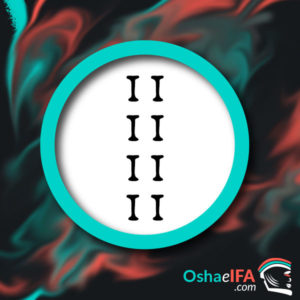




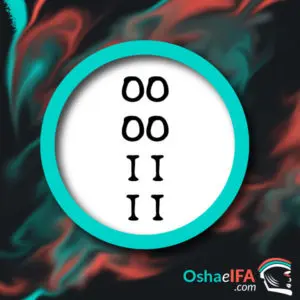
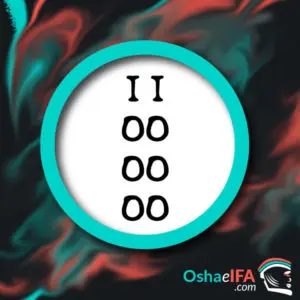
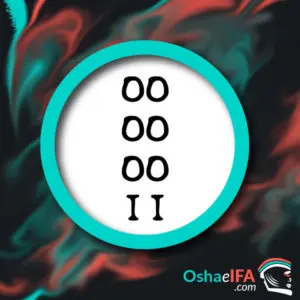
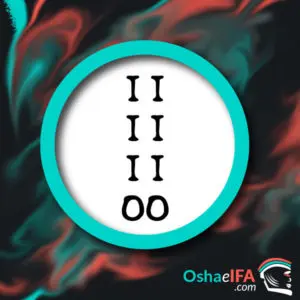
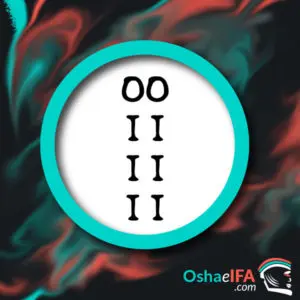
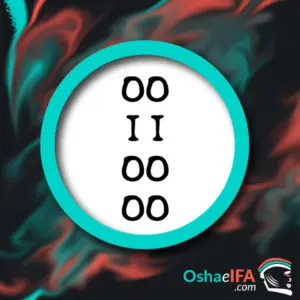
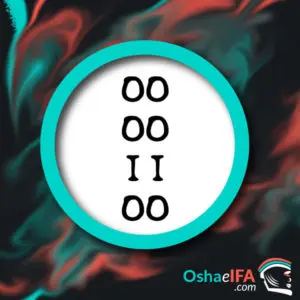
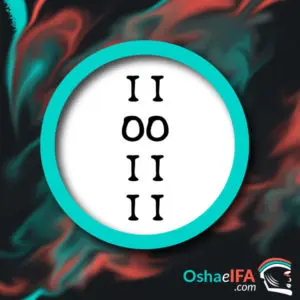
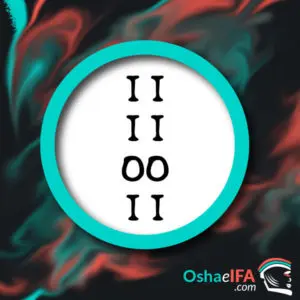

EXCELLENT INFORMATION.
ADUPE PUPO OOOOO 👑
Thank you so much.
Many blessings to all 🙏 🙌 Thank you for sharing this wonderful and valuable information.
Excellent information, I would like to have other signs to read and understand them.
Very very good indeed